Distinct methods on offer in energy arena
The Vietnamese government last week issued Decree No.80/2024/ND-CP permitting rooftop solar, waste-to-energy, and biomass projects to engage in direct power purchase agreements (DPPAs) without routing through Vietnam Electricity (EVN).
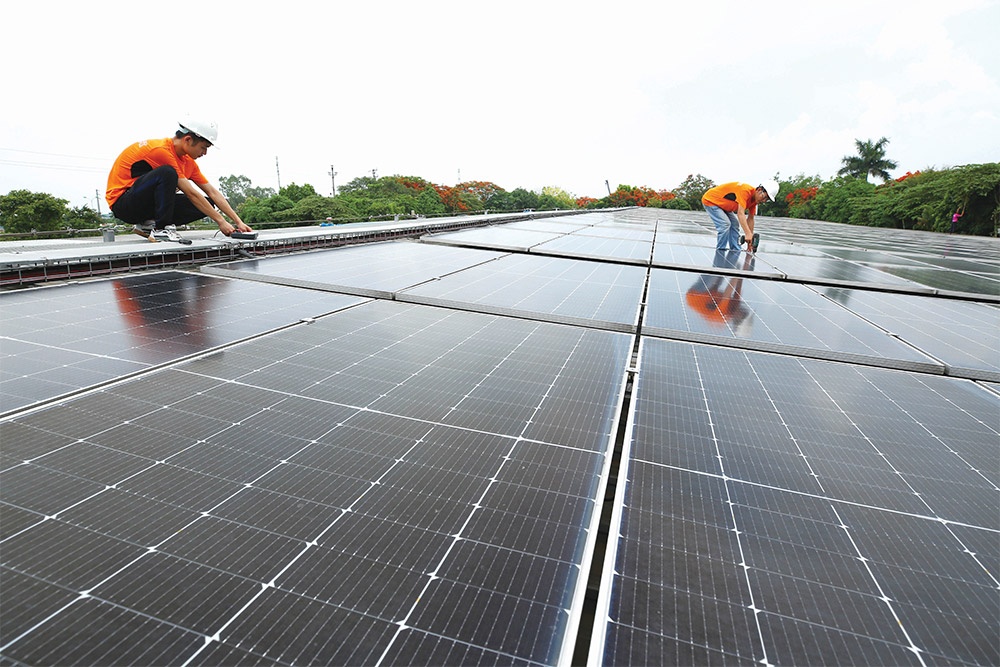 |
It establishes clear mechanisms for direct energy purchases between power harnessing units and large electricity consumers. This serves multiple goals, including meeting the growing market demand for clean energy, stimulating investment in renewable resources, and creating a competitive electricity retail market in Vietnam
Through the decree, effective immediately, the government allows direct power sales through two methods: private power lines and the national grid.
For private line transactions, renewable energy generators include solar, wind, small hydropower, biomass, geothermal, wave, tidal, ocean current, and rooftop solar power. These projects are not limited in capacity, but must be licensed to operate electricity or exempted from licensing following legal regulations.
For national grid transactions, only wind and solar power is covered. All cases are applied for 22 KV voltage or higher, with an average consumption of 200,000kWh per month.
Previously, customers only bought electricity through EVN and would not be privy to the electricity resources from thermal power, hydropower, or renewable energy projects. However, through the DPPA, they can make sure of using clean power, deemed significant for the manufacturing industry because Vietnam’s export goods are facing increasingly high green requirements.
Renewables expert Nguyen Phuong Mai said many countries in Europe or North America have high requirements for goods exported to their market that use electricity from renewable energy sources. “This decree will create strong conditions for manufacturers to prove to buyers and export markets that their products are made from renewable energy sources, along with certification,” Mai said.
Through the DPPA, businesses not only enjoy green certification, demonstrating their prestige in global commitments to renewable energy and sustainable development, but they also ensure long-term energy supply and mitigate risks of price fluctuations, Mai added.
However, operational issues need specific guidance. Pham Van Viet, chairman of Viet Thang Jean Co., Ltd., said that the company installed rooftop solar power several years ago with an average of 35 per cent surplus power capacity per month, equivalent to 600-700KWh.
“We have tools to count the amount of surplus electricity, so we want to sell this part to customers through the grid or a private transmission line. I am still looking forward to specific instructions and procedures to carry this out,” Viet said.
Ngo Duc Lam, former director of the Industrial Safety Techniques and Environment Agency under the Ministry of Industry and Trade (MoIT), said that the DPPA generates benefits to the state for not investing in new power sources.
“However, solar power is unstable, so there needs to be a suitable connection plan to not put pressure on the national grid,” Lam said. “A possible solution is to use a power storage device to transmit to the grid during times of no sunlight. But power storage equipment is not cheap, so businesses need additional support policies from the state.”
Tran Viet Ngai, chairman of the Vietnam Energy Association, said that rooftop solar power investors should carefully calculate before deciding to sell electricity through a private line or through the national grid.
“If the selling price is high enough to offset the cost of branch lines to transmit electricity, investors will choose this option. If the selling price is not good enough, selling electricity through the national grid will be more profitable. This means that the cost of private lines may be higher than purchasing through EVN, buyers will not participate if they see no benefit,” Ngai explained.
He added that a branch line must connect to the national power system, which is complicated and risky for system safety. Large customers want to buy cheap electricity during peak hours by DPPA, but they have to prepare a plan B when the weather is not guaranteed for power generation.
“If they return to buying electricity from the state when the DPPA market is congested, the national grid will always have to stand by to supply in time. It not only causes difficulties for the distribution stage but also raises the problem of waiting costs of the national power system,” Ngai emphasised.
Three wind power plants in the Central Highlands province of Gia Lai have not been able to come into operation, but Decree 80 opens up some opportunities for them to overcome difficulties in electricity distribution.
Tran Minh Tien, CEO of Eastern Power Group, commented, “We would prefer to carry out national grid transactions. However, we need more specific regulations on service prices of electricity infrastructure because the power plant is based in another locality from customers. We should connect to the national grid, and the state also has to collect service fees. There is some more work to do before putting it into operation.”
A survey by the MoIT revealed that about 20 large enterprises are keen on direct purchases, with a combined demand of nearly 1,000MW. Concurrently, 24 renewable energy projects with a capacity of 1,773MW are looking to sell electricity via DPPAs, while 17 projects with a capacity of 2,836MW are considering participation.
| According to Decree No.80/2024/ND-CP, for private power lines bypassing EVN, renewable energy projects are not restricted by capacity but must possess or be exempt from an electricity operation licence. Renewable energy producers and large consumers will sign purchase agreements with mutually agreed terms and prices. Excess electricity can be sold back to EVN under specific contracts detailing capacity, output, and pricing. Consumers can purchase electricity directly from renewable producers, National Power Transmission Corporation, or other retail electricity entities apart from EVN. Vietnam has over 100,000 rooftop solar projects with a total installed capacity exceeding 9,500MW. According to the country’s Power Development Plan VIII, this figure is set to increase by an additional 2,600MW by 2030 or cover half of government and residential buildings. For national grid transactions, the decree clarifies the sale of electricity through the spot market and via the National Power Transmission Corporation. Spot market prices are determined by the total market price of electricity during each transaction cycle, combining energy and capacity market prices in the wholesale market. In both scenarios, consumers must be entities or individuals using electricity for production at a voltage level of 22kV or higher, with an average monthly consumption of at least 200,000kWh. This threshold is lower than the previous draft’s 500,000kWh requirement. According to surveys by power corporations, 30 per cent of large customers use more than 500,000kWh, while over 7,700 customers, or 36.5 per cent of total electricity consumption, use 200,000kWh or more. |
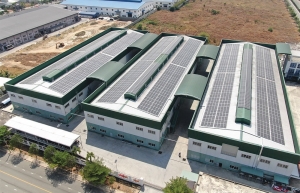 | Rooftop solar proposal deemed precautionary step A proposal to prevent self-producing and self-consuming rooftop solar power from being connected to the national electricity grid could discourage investors. |
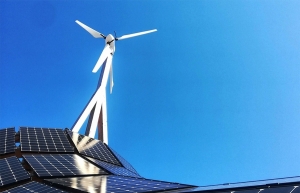 | Vietnam explores bypassing EVN on direct rooftop solar sales Rooftop solar, waste-to-energy, and biomass power projects may soon bypass state utility EVN for direct sales, according to Deputy Prime Minister Tran Hong Ha. |
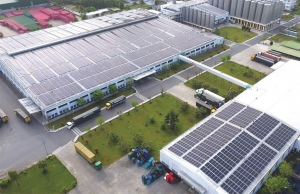 | ESG considerations light the path for SABECO’s success Saigon Beer-Alcohol-Beverage Corporation is promoting more green growth initiatives, demonstrating its steadfastness in the goal that business investment must go hand-in-hand with the nation’s sustainable development. |
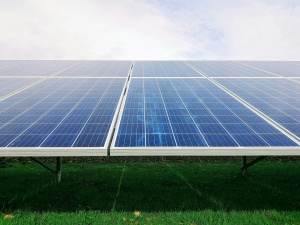 | Vietnam authorises DPPA for rooftop solar and biomass projects A recently issued government decree permits rooftop solar, waste-to-energy, and biomass projects to engage in direct power purchase agreements (DPPA) without routing through Vietnam Electricity (EVN). |
What the stars mean:
★ Poor ★ ★ Promising ★★★ Good ★★★★ Very good ★★★★★ Exceptional
Related Contents
Latest News
More News
- $100 million initiative launched to protect forests and boost rural incomes (January 30, 2026 | 15:18)
- Trung Nam-Sideros River consortium wins bid for LNG venture (January 30, 2026 | 11:16)
- Vietnam moves towards market-based fuel management with E10 rollout (January 30, 2026 | 11:10)
- Envision Energy, REE Group partner on 128MW wind projects (January 30, 2026 | 10:58)
- Vingroup consults on carbon credits for electric vehicle charging network (January 28, 2026 | 11:04)
- Bac Ai Pumped Storage Hydropower Plant to enter peak construction phase (January 27, 2026 | 08:00)
- ASEAN could scale up sustainable aviation fuel by 2050 (January 24, 2026 | 10:19)
- 64,000 hectares of sea allocated for offshore wind surveys (January 22, 2026 | 20:23)
- EVN secures financing for Quang Trach II LNG power plant (January 17, 2026 | 15:55)
- PC1 teams up with DENZAI on regional wind projects (January 16, 2026 | 21:18)

 Tag:
Tag:




















 Mobile Version
Mobile Version